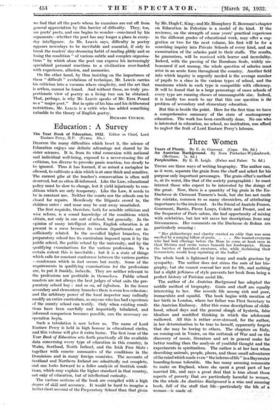Education : A Survey
The Year Book of Education, 1932. Editor in Chief, Lord Eustace Percy, M.P. (Evans. 35s.) DxsrrrE the many difficulties which beset it, the science of Education enjoys one definite advantage not shared by its sister sciences. It is, from its vital connexion with national and individual well-being, exposed to a never-ceasing fire of criticism, too diverse to provoke panic reaction, too steady to be ignored. Thus it has learned, if so mixed a metaphor be allowed, to cultivate a skin which is at once thick and sensitive. The current gibe at the teacher's conservatism is often well deserved, but as often ill-informed. Like the Law, educational policy must be slow to change, lest it yield injuriously to con- ditions which are only temporary. Like the Law, it needs to be in constant use. Neither the courts nor the schools can be closed for repairs. Mercilessly the litigants crowd in, the children enter : and none may be sent away unsatisfied.
The first requisite, therefore, both for sensible criticism and wise reform, is a sound knowledge of the conditions which obtain, not only in one sort of school, but generally. In the opinion of many intelligent critics, English education is at present in a mess because its various departments are in- sufficiently related. In the so-called higher branches, the preparatory school has its curriculum imposed upon it by the public school, the public school by the university, and by the qualifying examinations for the various professions. To a certain extent this is inevitable ; but it is a state of things which calls for constant conference between the various parties --conference which in fact occurs but rarely. Some of the requirements in qualifying examinations for the professions are, to put it frankly, imbecile. They are neither relevant to the professions nor profitable in themselves. Public school masters are not always the best judges of what suits the pre- paratbry school boy : and so on, ad infinitum. In the lower secondary and elementary branches there is even less cohesion ; and the arbitrary power of the local inspector may radically modify an entire curriculum, as anyone who has had experience of the county school can testify. Only when existing condi- tions have been carefully and impartially tabulated, and informed comparison becomes possible, can the necessary co- operation begin.
Such a tabulation is now before us. The name of Lord Eustace Percy is held in high honour in educational circles, and this volume will give it extra lustre. The first issue of the Year. Book of Education sets forth practically all the available data concerning every type of education in this country, in Wales, Scotland, North Ireland, and the Irish Free State : together with concise summaries of the conditions in the Dominions and in many foreign countries. The accounts of Scotland and Northern Ireland are admittedly not complete, and one looks forward to a fuller analyiis of Scottish condi- tions, which may explain the higher standard in that country, not only of education, but of intellectual curiosity.
The various sections of the book are compiled with a high degree of skill and accuracy. It would be hard to imagine a better short account of the Preparatory School than that given
by Mr. Hugh C. King ; and Mr. Humphrey E. Bowman's chapter on Education in Palestine is a, model of its kind. If the reviewer, on the strength of some years' practical experience in the different grades of educational work, may offer a sug- gestion or two for the next volume, his first will be for a searching inquiry into Private Schools of every kind, and, an examination of the salaries paid to their staffs. The results, he guarantees, will be received with horror and incredulity. Indeed, with the passing of the Burnham Scale, widely un- honoured if not unsung, the whole question of salaries must arise in an acute form throughout the country. Another field into which inquiry is urgently needed is the average number of pupils to a class in the various types of school, and the maximum which in each type is compatible with efficiency. It will be found that in a large percentage of cases schools of every type are running classes of unmanageable size. Indeed, it is hardly too much to say that this one question is the problem of secondary and elementary education.
But this is beside the point. Here for the first time we have a comprehensive summary of the state of contemporary education. The work has been excellently done. No one who is interested in education, no school, no institution, can afford to neglect the fruit of Lord Eustace Percy's labours.


































 Previous page
Previous page